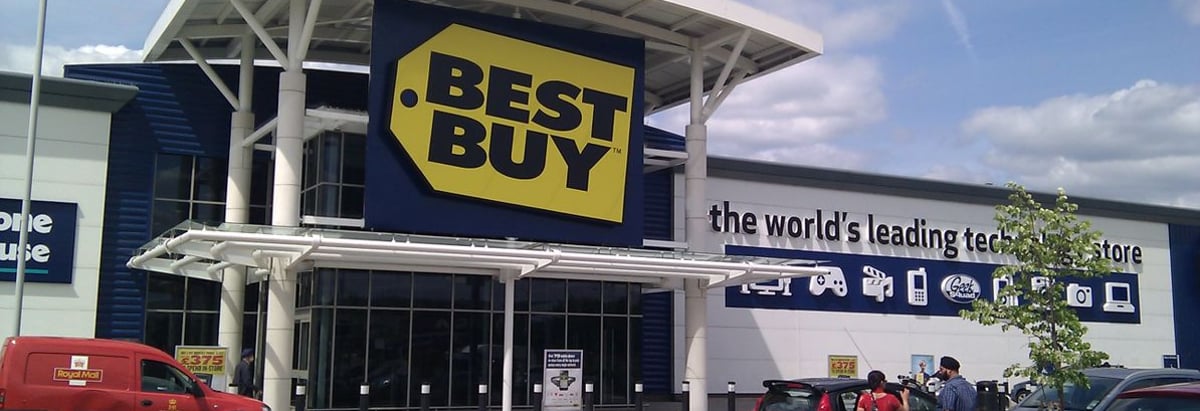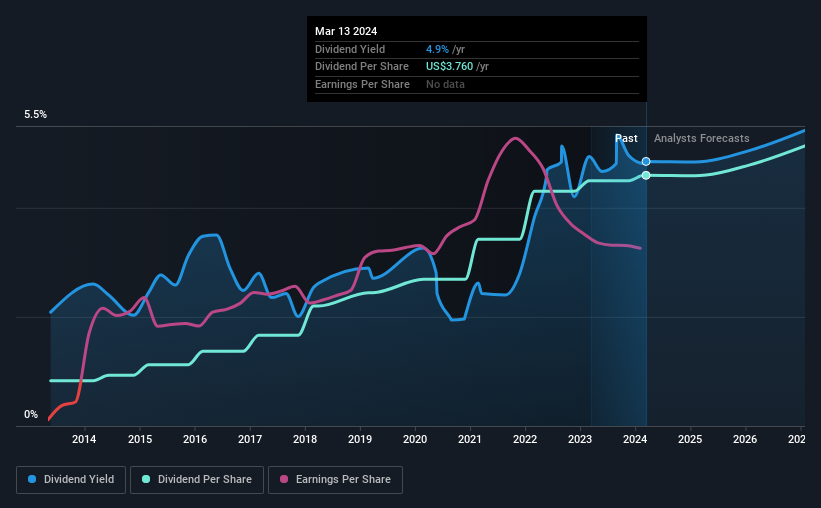- United States
- /
- Specialty Stores
- /
- NYSE:BBY
Best Buy (NYSE:BBY) Is Paying Out A Larger Dividend Than Last Year

The board of Best Buy Co., Inc. (NYSE:BBY) has announced that it will be paying its dividend of $0.94 on the 11th of April, an increased payment from last year's comparable dividend. This will take the annual payment to 4.9% of the stock price, which is above what most companies in the industry pay.
View our latest analysis for Best Buy
Best Buy's Dividend Is Well Covered By Earnings
While it is great to have a strong dividend yield, we should also consider whether the payment is sustainable. The last payment was quite easily covered by earnings, but it made up 120% of cash flows. This signals that the company is more focused on returning cash flow to shareholders, but it could mean that the dividend is exposed to cuts in the future.
Looking forward, earnings per share is forecast to rise by 30.7% over the next year. If the dividend continues along recent trends, we estimate the payout ratio will be 57%, which is in the range that makes us comfortable with the sustainability of the dividend.

Best Buy Has A Solid Track Record
The company has been paying a dividend for a long time, and it has been quite stable which gives us confidence in the future dividend potential. The annual payment during the last 10 years was $0.68 in 2014, and the most recent fiscal year payment was $3.76. This implies that the company grew its distributions at a yearly rate of about 19% over that duration. Rapidly growing dividends for a long time is a very valuable feature for an income stock.
Dividend Growth May Be Hard To Achieve
Investors who have held shares in the company for the past few years will be happy with the dividend income they have received. Although it's important to note that Best Buy's earnings per share has basically not grown from where it was five years ago, which could erode the purchasing power of the dividend over time. Best Buy is struggling to find viable investments, so it is returning more to shareholders. While this isn't necessarily a negative, it definitely signals that dividend growth could be constrained in the future unless earnings start to pick up again.
Our Thoughts On Best Buy's Dividend
In summary, while it's always good to see the dividend being raised, we don't think Best Buy's payments are rock solid. While Best Buy is earning enough to cover the payments, the cash flows are lacking. We don't think Best Buy is a great stock to add to your portfolio if income is your focus.
Investors generally tend to favour companies with a consistent, stable dividend policy as opposed to those operating an irregular one. Still, investors need to consider a host of other factors, apart from dividend payments, when analysing a company. Case in point: We've spotted 3 warning signs for Best Buy (of which 1 can't be ignored!) you should know about. If you are a dividend investor, you might also want to look at our curated list of high yield dividend stocks.
Valuation is complex, but we're here to simplify it.
Discover if Best Buy might be undervalued or overvalued with our detailed analysis, featuring fair value estimates, potential risks, dividends, insider trades, and its financial condition.
Access Free AnalysisHave feedback on this article? Concerned about the content? Get in touch with us directly. Alternatively, email editorial-team (at) simplywallst.com.
This article by Simply Wall St is general in nature. We provide commentary based on historical data and analyst forecasts only using an unbiased methodology and our articles are not intended to be financial advice. It does not constitute a recommendation to buy or sell any stock, and does not take account of your objectives, or your financial situation. We aim to bring you long-term focused analysis driven by fundamental data. Note that our analysis may not factor in the latest price-sensitive company announcements or qualitative material. Simply Wall St has no position in any stocks mentioned.
About NYSE:BBY
Best Buy
Engages in the retail of technology products in the United States, Canada, and international.
Flawless balance sheet 6 star dividend payer.

